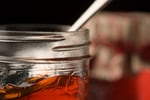In a citizen’s petition filed in 2008, Joanne Tobacman, MD, a researcher at the University of Illinois, urged the FDA to ban carrageenan in foods on the grounds that it promotes inflammation of the GI tract, which could ultimately lead to diseases from ulcerative colitis to colon cancer.
However, in a letter to Dr Tobacman dated June 11, 2012, rejecting her request, the FDA said her studies - which were all in-vitro or ‘test-tube’ studies exposing human colonic epithelial cells to carrageenan -were of “limited value” when trying to determine the safety of ingesting foods containing the ingredient.
And while concerns have been raised about a lower-weight polysaccharide called poligeenan, studies conducted on animals and artificial stomachs suggested that carrageenan - a high-molecular weight polysaccharide - did not show “extensive” breakdown into poligeenan when we eat products that contain it, said the FDA.
Cornucopia: ‘We urge all companies to remove this ingredient from the foods and beverages they sell’
However, in a press release entitled ‘Food Additive (Carrageenan) Suspected in GI Disease/Tumors’, Wisconsin-based non-profit the Cornucopia Institute said the FDA’s evaluation of Dr Tobacman’s petition was “sloppy and incomplete” and urged it to re-consider.
Charlotte Vallaeys, Cornucopia's director of food policy, said: “Given that carrageenan appears to do to your gut what poison ivy does to your skin, we urge all companies to remove this ingredient from the foods and beverages they sell.”

Cornucopia, which has just published a report entitled, ‘Carrageenan: How a ‘natural’ food additive is making us sick’, went on to quote several concerned scientists, including Dr Stephen Hanauer, MD, chief of Gastroenterology, Hepatology and Nutrition at the University of Chicago’s School of Medicine, who is conducting a study on patients with ulcerative colitis with Dr Tobacman.
“Since carrageenan has been found to cause colitis in animal models of ulcerative colitis we felt it would be important to perform a well-controlled dietary study to determine whether carrageenan causes exacerbations of ulcerative colitis in patients in clinical remission,” he said.
“The rising incidence and prevalence of ulcerative colitis across the globe is correlated with the increased consumption of processed foods, including products containing carrageenan.”
No new data has been presented to the FDA to warrant a re-evaluation

However, Dr Harris ‘Pete’ Bixler, who founded carrageenan specialist Ingredients Solutions Inc in the early 1990s, told FoodNavigator-USA that the FDA and other organizations including USDA, the Joint WHO/FAO Expert Committee on Food Additives (JECFA), and the International Agency for Research on Cancer (IARC) had found carrageenan to be safe in the human diet.
Meanwhile, no meaningful new data had been presented to the FDA to warrant a re-evaluation, he said.
But to reassure people further, Marinalg International, an association representing producers of seaweed-derived hydrocolloids, is co-ordinating new research specifically to address the points raised by Dr Tobacman, added Dr Bixler.
“We’re hoping to present the findings later this year, but we are looking at whether the conclusions she has drawn have any real relevance when applied to foods in the human diet.”
Oral feeding studies have repeatedly shown that carrageenan in foods we consume does not ‘degrade’ into poligeenan
The research will also explore whether carrageenan permeates the epithelium of the GI tract; and whether it degrades into poligeenan after we swallow it, he said.
“Oral feeding studies have repeatedly shown that carrageenan in foods we consume does not ‘degrade’ into poligeenan. But we want to put this issue to bed once and for all.”
In fact, a lot of problems had been caused by people confusing poligeenan with carrageenan, claim suppliers, who argue that intestinal lesions have only been found in studies where poligeenan - and not food grade carrageenan - was the test substance
However, Dr Tobacman insists that “in vivo, it is highly likely that high molecular weight carrageenan will break down into lower molecular weight forms by stomach acid, mechanical processes of digestion, effects of colonic bacteria, or heat.”
CP Kelco: FDA has reviewed the evidence and found that carrageenan is safe
While it is hard to see why the FDA might reconsider Dr Tobacman’s petition in the absence of any new data, it will be frustrating if manufacturers seek to avoid carrageenan because of the negative media coverage Cornucopia has generated, said CP Kelco spokeswoman Jane Schulenburg, citing a lengthy article in the Chicago Tribune published yesterday.
“Some firms such as Stonyfield Farms recently committed to remove carrageenan from their products, but it’s too early to determine the impact of the Chicago Tribune article.
“However, as the FDA has reviewed the evidence and found that carrageenan is safe, we hope that manufacturers will take it at its word.”
Marinalg: Both the FDA and the WHO agree that carrageenan is safe for use in food
Commenting on the Cornucopia report, Marinalg president William Matakas said: “Currently, there is increased interest in the safety of carrageenan… This increased attention is coming from a small group of individuals associated with a handful of small organizations who do not understand the product, its 600-year history, how it is farmed and processed or its significance to global food production.
“Decades of scientific studies have confirmed the safety of carrageenan. Both the FDA and the World Health Organization agree that carrageenan is safe for use in food.”
He added: “Carrageenan is not the same as poligeenan.
“Poligeenan is a toxic substance that requires an aggressive process using strong acids and high temperatures over an extended period of time compared to the minimal processing required to release and purify carrageenan."
Carrageenan is widely used as a thickening, gelling and emulsifying agent in foods and beverages
Carrageenan is widely used in the food industry for its gelling, thickening and stabilizing properties. Its main application is in dairy and meat products, but is also widely used in vegetarian and vegan products as an alternative to gelatin.
It is extracted from red seaweed via soaking, filtering and drying, and undergoes no chemical change during processing, says Marinalg.
"Food grade quality carrageenan is obtained by a multistep process avoiding any degradation.
“After careful washing, the seaweed is dissolved in warm alkaline water and filtered.
“The product is then recovered by precipitation with isopropyl alcohol and dried at a low temperature.
"There is also an alternative recovery process that consists of dewatering a salt-gelled solution by pressing or freeze-thawing."
The Cornucopia Institute is an advocacy group that says it represents the interests of organic and small-scale farmers.
